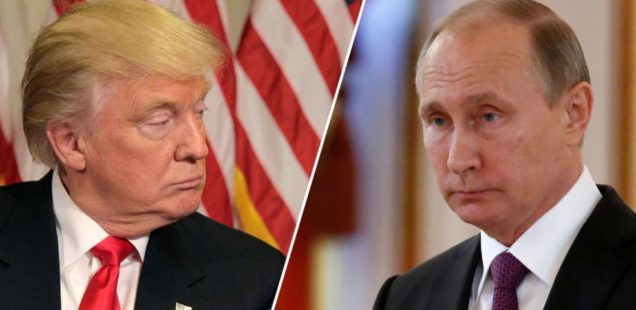
Trump Talks to Putin, and Suddenly Ukraine’s in Play
Fighting erupted in Ukraine after many months of uneasy but consistent calm after Donald Trump and Vladimir Putin, the U.S. and Russian presidents, finally spoke for the first time last weekend by telephone. Instantly, the Trump White House is faced with one of the tough foreign policy questions that proved quite beyond Barack Obama’s capacities. By most accounts, Ukraine wasn’t a major topic during the Trump–Putin exchange, but Trump has a major policy judgment on his hands now.
Related: No, Trump Did Not Just Roll Back Sanctions on Russia
While Trump was always clear about defrosting ties with Russia during last year’s campaigns, it was among the many ideas that came with a question. Will he or won’t he remove the sanctions, given formidable opposition to any such idea in the Pentagon, the national security agencies, and NATO?
Now we know. This isn’t a hotel deal or a Miss Universe pageant or some kind of mutual admiration club. Détente is the White House policy as of last Saturday. The two leaders did not discuss the Western sanctions against Russia now in place, and there was no talk that Russia meddled in the elections to put Trump in the White House.
In a 50–minute exchange, they spoke of making common cause against international terrorism and improving economic ties; they determined to hold a summit—the shake-hands kind—later this year. Trump did sign a memorandum, the same day ordering security agencies to devise a new anti-terror blueprint. Among its instructions was “identification of new coalition partners in the fight against ISIS.”
Sounds like the beginning of a détente story, although John Kerry and the Obama administration tried for months to cut a deal on “the possibility of Russian-American cooperation in the fight against terrorist groups in Syria.” Clearly, cooperation does not always signal détente. For Donald Trump, terrorism is an obvious call as a shared concern between Moscow and Washington. But don’t think for a moment the defense and security establishments are going to rest their case against any warming of U.S.–Russian ties.
Related: In Trump’s White House, Even the Leakers Can’t Get Their Stories Straight
The renewal of violence in Ukraine, this time centered on the town of Avdiivka, is a direct test of Trump’s determination to stick to his position on U.S.–Russian relations. Whoever is responsible for renewing the conflict—and we can’t know this yet—seems to have just this test in mind. Given the timing, it’s logical to start with who has the most to gain or lose in Ukraine.
As Russian media make plain, Moscow’s practically breathless to enter a “new partnership” with Washington. It’s hard to think why Putin would follow a successful first encounter with battlefield aggression.
The Washington Post postulates that Russia’s intent was to sabotage a meeting this week between Angela Merkel, the German chancellor, and Ukrainian President Petro Poroshenko. Does this make sense? Merkel force-marched Poroshenko into the ceasefire known as Minsk II—signed two years ago this month—and has consistently favored a settlement very close to Putin’s idea of a Ukrainian federation. More likely, a report from Radio Free Europe/Radio Liberty direct from Ukraine last Monday is on point:
“Frustrated by the stalemate in this 33–month war of attrition, concerned that Western support is waning, and sensing that U.S. President Donald Trump could cut Kyiv [Kiev] out of any peace negotiations as he tries to improve fraught relations with Moscow, Ukrainian forces anxious to show their newfound strength have gone on what many here are calling a ‘creeping offensive.’”
Trump is in a spot either way. The news from Ukraine strengthens the hand of those opposed to his détente project. He could drop it, but that’s unlikely since his commitment to better ties appears serious and durable. Is the Trump White House smart enough to huddle with Merkel and resuscitate the barely breathing Minsk II, which the U.S. was not asked to negotiate? Let’s hope so: It remains the most promising proposition on the table.
In the bargain, the president could improve his approval ratings among the Europeans who are fed up with the standoff over Ukraine. He could use the boost, to put the point mildly.

